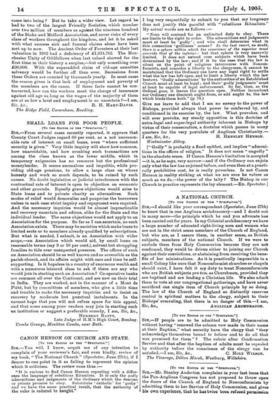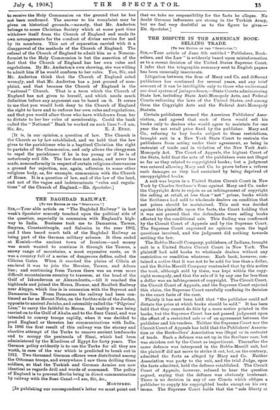[To THE EDITOR OF TEL "SPEHTATOIL1 SIR,—Mr. Stanley Auderton complains
in your last issue that the Pan-Anglican Congress has not proposed to throw open the doors of the Church of England to Nonconformists by admitting them to her Service of Holy Communion, and gives his own experience, that he has twice been refused permissioa
to receive the Holy Communion on the ground that he has not been confirmed. The answer to his complaint may be given on historical grounds,—namely, that Mr. Anderton belongs to some Christian Society which at some past time withdrew itself from the Church of England and made its own arrangements for the conduct of divine service for and by its members. This act of separation carried with it a disapproval of the methods of the Church of England. The refusal of the Church of England to admit him as a Noncon- formist to the Holy Communion is but the assertion of the fact that the Church of England has her own rules and regulations. By Mr. Anderton's own showing, she was willing to admit him if he would conform to her rules. You, Sir, and Mr. Anderton think that the Church of England acted wrongly, and that Mr. Anderton has a just ground of com- plaint, and that because the Church of England is the "national" Church. That is a term which the Church of England has not given to herself, and which needs much definition before any argument can be based on it. It seems to me that you would both deny to the Church of England the right to have and to enforce her own rules and regulations, and that you would allow those who have withdrawn from her to dictate to her her rules of membership. Could the bank called the " National" Bank be worked on such lines ?—I am,
[It is, in our opinion, a question of law. The Church is the Church as by law established, and we hold that the law gives to the parishioner who is a baptised Christian the right to partake of the Communion, and only allows the clergyman to repel the parishioner if he is too young or if he is of notoriously evil life. The law does not make, and never has made, nonconformity in respect of certain religious Observances a ground for rejection, nor, again, adhesion to some other religious body, as, for example, communion with the Church of Rome. It is a question of law, and of the law of the land, and not of the vague and indeterminate "rules and regula- tions" of the Church of England.—En. Spectator.]



















































 Previous page
Previous page